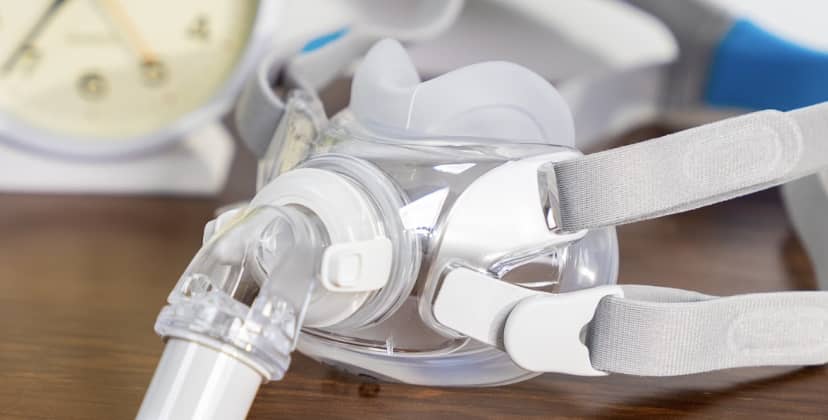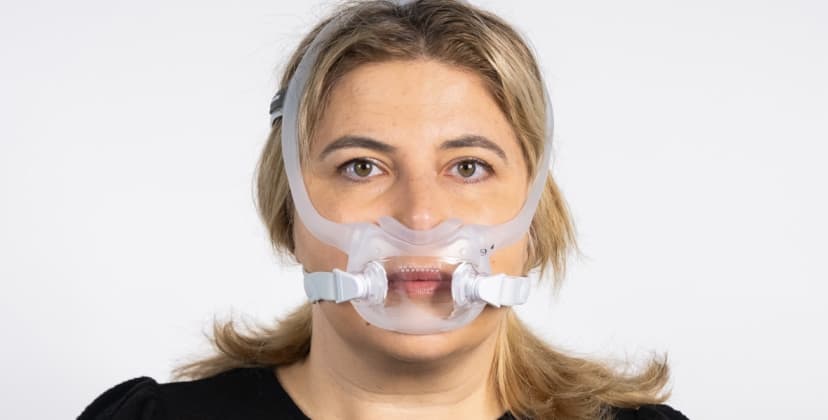When you buy through our links, we may earn a commission. Products or services may be offered by an affiliated entity. Learn more.
Best Full-Face CPAP Masks of 2026
Continuous positive airway pressure (CPAP) therapy is a sleep apnea treatment designed to keep your airway open during sleep by blowing pressurized air into your throat. The airflow is delivered through a mask that can come in several different designs, with one option being a full-face CPAP mask.
As opposed to a nasal mask, a full-face CPAP mask covers both the nose and mouth. This design ensures the machine can deliver air even if you have a stuffy nose. You may also prefer a full-face CPAP mask if you’ve been prescribed a high air pressure setting, as it takes some of the burden off the nose.
Despite the intimidating name, full-face CPAP masks don’t actually cover the entire face — just the nose and mouth. And the best full-face CPAP masks use innovative designs to allow a clear field of vision and minimal facial contact. We’ll explore some of our favorite models and discuss how to know if a full-face mask is right for you.
Our Top Picks
Swipe for more
Best Overall Full Face Mask
ResMed AirFit F20 Full Face CPAP Mask
Use this link for the most current ResMed discount
Use this link for the most current ResMed discount
The ResMed AirFit F20 is a great choice for sleepers seeking a quieter mask. The ventilated design not only minimizes noise but also makes the mask more comfortable to wear while sleeping on your side.

Credit: Sleep Foundation Test Lab
Price
$155
Full Details
Some side sleepers may find full face masks too uncomfortable to wear through the night, but the ResMed AirFit F20 Full Face CPAP Mask has an adaptive design that promotes strong contouring to your face. This means the mask should feel fairly comfortable for most sleepers, including those who sleep on their side.
What Does It Do?
The mask and headgear have seven contour points and wings that provide a close, adaptive fit without excessive pinching or rubbing. This model’s emphasis on comfort continues with other aspects of its design, including a soft nose bridge, a frosted silicone cushion that some people find less irritating, and a headgear design that contours around the chin for extra support.
Who It’s Best for
Thanks to its special contouring design, the AirFit F20 should feel comfortable for most people whether they sleep on their back or side. The mask is also designed to be quieter than many options on the market, thanks to the QuietAir venting technology, which uses multidirectional openings to break up exhaled air and allow venting from multiple areas. The reduced noise may appeal to couples or light sleepers who wake easily at night.
Customers can purchase the AirFit F20 with small, medium, or large headgear, although the cushion is only available in small or medium. Both the headgear and cushion can be purchased separately for regular replacement. This face mask is compatible with all CPAP machines that use standard tubing and is covered by a 90-day limited warranty.
Disclaimer: In November 2023, ResMed issued a safety notice cautioning that the magnetic clips on this model and other ResMed masks should be kept at least 6 inches away from any implanted medical device that may be affected by magnets, including pacemakers and insulin pumps. The company also warns that other metallic implants such as valves, stents, and certain dental implants may be impacted by the magnetic clips.
Best Full Face Mask for Side Sleepers
ResMed AirFit F30 Full Face CPAP Mask
Use this link for the most current ResMed discount
Use this link for the most current ResMed discount
Gentle headgear, a streamlined profile, and swiveling port for the connective tubing make ResMed’s AirFit F30 an ideal full-face CPAP mask for side sleeping. The unobtrusive design is also a good match for people who wear glasses and enjoy reading or watching television in bed.

Credit: Sleep Foundation Test Lab
Price
$170
Full Details
The ResMed AirFit F30 is designed for people who need high pressure levels during CPAP therapy. This full-face mask forms a secure seal over your nose and mouth, and you can adjust the straps to fit your face’s unique dimensions. Magnetic clips allow you to put on and take off the mask with ease, and you can choose from two sizes for added comfort.
What Does It Do?
As a full-face mask, the ResMed AirFit F30 delivers air directly into your nose and mouth. Small and medium sizes are available — you can use Sleep Doctor’s interactive size chart on the mask’s product page to determine which design will provide the most comfortable fit. A swivel port for the connective tubing allows you to seamlessly switch between the back and side sleep positions, while the mask’s low profile makes minimal contact with your forehead and cheeks to ensure full line of sight at all times.
Who It’s Best for
Full-face masks can be somewhat cumbersome, but with the AirFit F30, you can comfortably wear glasses and won’t have your vision blocked. We recommend this mask to people who enjoy reading or watching television in bed before falling asleep. You should also consider the F30 if you primarily breathe through your mouth and require high pressure settings during your CPAP therapy.
Although the mask is more expensive than average, the sticker price is still approachable and standard ground shipping is free of charge. If you order through Sleep Doctor and sign up for a subscription, you’ll also receive a 15% discount on your order. The mask may be returned new and unopened within 60 days of the delivery date.
Disclaimer: In November 2023, ResMed issued a safety notice cautioning that the magnetic clips on this model and other ResMed masks should be kept at least 6 inches away from any implanted medical device that may be affected by magnets, including pacemakers and insulin pumps. The company also warns that other metallic implants such as valves, stents, and certain dental implants may be impacted by the magnetic clips.
Best Full Face Mask for Combination Sleepers
Philips Respironics DreamWear Full Face CPAP Mask
Use this link for the most current Philips Respironics discount
Use this link for the most current Philips Respironics discount
If you’re looking for a mask that balances a comfortable fit with effective sealing, the Philips Respironics Dreamwear is a great option.

Credit: Sleep Foundation Test Lab
Price
$135
Full Details
Full-face masks offer some excellent benefits, but some sleepers find them too obtrusive to wear. The DreamWear by Philips Respironics addresses this issue with an innovative design that may appeal to anyone who needs a full-face mask with an ultra-low profile.
What Does It Do?
Instead of covering the entirety of the nose and mouth, the DreamWear seals beneath the nose and lower lip for full-face performance that feels more like a nasal mask. To complement this low profile, the DreamWear’s tubing connection is located at the top of the head. Four adjustment points on the DreamWear’s headgear make it easy to find a comfortable fit and effective seal. The DreamWear has one-size-fits-all headgear that can be purchased separately, along with extra cushions and soft fabric wraps for the headgear.
Who It’s Best for
Active sleepers, side sleepers, and people who feel constricted by other full-face masks are all likely to appreciate the streamlined design of this DreamWear mask. The mask and mask cushions are also available in an extra-wide design, along with standard small, medium, and large sizes. The variety of sizes helps ensure most users can find the correct fit, which is important for preventing leakage.
Since it uses standard tubing, the DreamWear should be compatible with nearly any CPAP machine. This face mask is backed by a 90-day limited warranty.
Disclaimer: In 2022, Philips Respironics issued a product recall for this and other mask models due to potentially dangerous interactions between the magnetic headgear clips and certain implanted medical devices, including pacemakers, metallic stents and clips, and magnetic denture attachments. Speak with your doctor if you have concerns about the safety of this or any other CPAP product.
Best Full Face Mask for Restless Sleepers
ResMed AirFit F40 Full Face CPAP Mask
With slim tubing and a wide-set frame, the AirFit F40 may be ResMed’s most streamlined full-face CPAP mask yet. For maximum comfort, the frame and headgear are each available in three different sizes.

Price
$155
Full Details
If you’re a restless sleeper prone to tossing and turning, the CPAP mask you use can affect how comfortable you feel throughout the night — for better or worse. ResMed’s AirFit F40 offers a streamlined design with thin, flexible headgear and a frame that affords full line of sight. You can adjust the straps for a fit that’s both comfortable and secure, and multiple sizes are available for the frame and headgear.
What Does It Do?
As a full-face mask, the AirFit F40 forms a tight seal over the area between the bridge of your nose and the bottom of your mouth. The silicone cushion is both gentle and secure, so you shouldn’t experience much, if any, irritation or lose pressure due to air leaks.
Another notable feature is the tubing, which is exceptionally thin and connected to the mask via an elbow port. This allows the mask to move with you as you roll over and change positions in bed. Daily cleaning is required — please review the care instructions to keep your mask hygienic.
Who It’s Best for
The wide-set frame creates ample space from temple to temple, allowing users to wear eyeglasses without pinching or jostling. Full line of sight also makes the mask ideal for people who enjoy watching television or reading in bed before falling asleep. Since the AirFit F40 is a full-face design, the mask is a good match if you require high pressure levels for your CPAP therapy. That said, your doctor can provide more insight into the best full-face mask for you.
Shipping is free for U.S. customers who purchase their AirFit F40 through Sleep Doctor, and the mask may be returned unopened and unused within 60 days for a full refund. ResMed backs this product with a 90-day warranty.
Disclaimer: In November 2023, ResMed issued a safety notice cautioning that the magnetic clips on this model and other ResMed masks should be kept at least 6 inches away from any implanted medical device that may be affected by magnets, including pacemakers and insulin pumps. The company also warns that other metallic implants such as valves, stents, and certain dental implants may be impacted by the magnetic clips.
Best Overall
ResMed AirFit F20 Full Face CPAP Mask
Use this link for the most current ResMed discount
Shop at Sleep DoctorA flexible full-face CPAP mask with a ventilated design to minimize noise and make side sleeping more comfortable.
See More Details

Credit: Sleep Foundation Test Lab
Best for Side Sleepers
ResMed AirFit F30 Full Face CPAP Mask
Use this link for the most current ResMed discount
Shop at Sleep DoctorA full-face mask with a swiveling tube port to ensure comfortable sleep in any position, including either side.
See More Details

Credit: Sleep Foundation Test Lab
Best for Combination Sleepers
Philips Respironics DreamWear Full Face CPAP Mask
Use this link for the most current Philips Respironics discount
Shop at Sleep DoctorA lightweight full-face mask with top-of-head tubing to ensure steady airflow for combination sleepers.
See More Details

Credit: Sleep Foundation Test Lab
Best for Restless Sleepers
ResMed AirFit F40 Full Face CPAP Mask
A streamlined full-face mask with slim tubing, flexible headgear, and three size options.
See More Details

Who Should Use a Full-Face CPAP Mask?
Full-face masks are a common choice for CPAP users who breathe through their mouth and those who use higher CPAP pressure settings. Some people may also simply find a full-face mask more comfortable than a model that delivers pressurized air to just the nose.
You may benefit from using a full-face CPAP mask if you…
- Breathe through your mouth: A full-face CPAP mask is often recommended to people who tend to breathe through their mouth while they sleep. Since the mask blows air into both the mouth and nose, there is less chance for air to escape through the mouth, as it might with a nasal mask.
- Use a high pressure setting: People prescribed higher air pressure settings may also prefer to wear a full-face mask, as high amounts of airflow can be uncomfortable when delivered through the nose.
- Experience frequent nasal congestion: A full-face mask may be more comfortable for people who often have stuffy noses from allergies, or those with certain physical traits such as a deviated septum, as these conditions make it difficult to deliver air into the nose. Talk with your doctor about treatment options if you frequently experience nasal congestion.
Unless you have a specific reason for using a full-face mask, such as a chronically blocked nose, many experts recommend trying a nasal mask first. It’s not uncommon for people to start breathing through their nose once they start CPAP therapy, and nasal masks are usually considered more effective. In particular, people with facial hair, active sleepers, and those who typically sleep on their stomach may find a nasal mask to be more comfortable.
Are There Different Types of Full-Face CPAP Masks?
Full-face masks typically extend from the chin to the bridge of the nose, but models with smaller and larger footprints are also available.
| Mask Type | Description |
|---|---|
| Standard Full-Face CPAP Mask | Standard full-face CPAP masks deliver air through a triangular cushion that covers both the mouth and nose. Typically made of silicone, gel, or cloth, the cushion covers the mouth and nose, with the uppermost point resting against the bridge of the nose. |
| Hybrid CPAP Mask | Hybrid CPAP masks are a less bulky form of full-face mask. Though they still form a seal around the mouth, they don’t extend to the bridge of the nose. Some models have nasal pillows that seal inside the nostrils, while others have nasal cradle designs that rest below the nose and seal around the nostrils. |
| Total Face CPAP Mask | As the name suggests, total face masks cover the entire face, from the forehead to the chin. This style isn’t common, but it may be prescribed as a last resort for people who struggle to obtain a seal with other mask types. |
What to Consider When Buying a Full-Face CPAP Mask
A full-face CPAP mask is an integral component of CPAP treatment and something you’ll wear every night, so it’s not a purchase that should be taken lightly. You’ll want to consider comfort, compatibility with other CPAP components, brand reliability, and most importantly, your doctor’s recommendations.
Doctor’s Recommendations
Your doctor’s professional opinion is paramount when choosing a CPAP mask. They can work with you to find a mask that’s comfortable and delivers effective sleep apnea treatment based on your specific symptoms and CPAP machine settings.
Sleeping Position
Depending on your sleeping position, there’s a risk that the mask or tubing may catch on your bedding. This can tug the mask askew and lead to air leaks. Compared to a nasal mask or nasal pillow mask, a full-face mask is more likely to be knocked out of place by bedding or pillows.
While sleeping on the back is best for masks with front-of-face tubing, you may find that a top-of-head tubing design also allows you to move freely when sleeping on your side. By contrast, sleeping on your stomach is difficult with a full-face mask. If you’re a dedicated stomach sleeper, you may want to consider a nasal pillow mask or use a specially adapted CPAP pillow.
Comfortable Fit
A full-face CPAP mask should fit snugly, forming a seal around the mouth and nose to deliver air effectively without being painfully tight. Manufacturers typically provide sizing guides to help you order a mask based on your measurements. To a certain extent, you can also adjust your mask by tightening or loosening the headgear straps.
Mask cushions can be made using a variety of materials such as silicone, cloth, or memory foam, so don’t be afraid to try out different mask models until you find one that feels comfortable.
Machine and Hose Compatibility
The vast majority of CPAP masks are compatible with all CPAP machines and all tubing that uses a standard 22-millimeter cuff connector, but we recommend double-checking compatibility before making a purchase. For example, the ResMed AirMini, a popular travel CPAP machine, is only compatible with specific ResMed masks unless you purchase a separate adapter.
Warranty and Recalls
Manufacturers typically provide a short warranty to protect consumers against manufacturing and workmanship defects. For CPAP masks, the warranty term is typically three months, with individual components sometimes having different warranty periods.
Occasionally, a CPAP manufacturer discovers an issue with its equipment that may pose problems for users. In this case, the company issues a product recall, asking users to return their equipment and receive a different model as a replacement. If a product is recalled, you should be able to find information about the recall directly from the manufacturer or on the Food and Drug Administration website.
Where to Buy a Full-Face CPAP Mask
You can buy a full-face CPAP mask in medical stores or from online retailers. You may also be able to obtain a mask through your doctor or sleep specialist.
How Much Does a Full-Face CPAP Mask Cost?
The average price of a full-face CPAP mask, including the headgear, cushion, frame, and tubing connector, ranges from $60 to $200. Masks with added features tend to cost more than basic models. You’ll also need to factor in the cost of replacement accessories, as many of the mask parts need to be replaced several times a year.
Prescriptions and Insurance Coverage
CPAP masks are considered a Class II medical device and can only be purchased with a prescription. You can, however, buy replacement components for the mask without a prescription.
Medicare, Medicaid, and many private health insurance plans cover part of the cost of CPAP therapy equipment when it is purchased from a participating provider. To qualify for coverage, you’ll typically need to prove you’ve been using your machine at least four hours per night, 70% of nights, and that it’s helping treat your sleep apnea.
Dive Deeper: In-Depth CPAP Guides
If you need additional CPAP products to go along with your CPAP mask, check out our team’s picks in a variety of categories.
Data-Driven Results You Can Trust
The team at SleepFoundation.org has many years of experience reviewing sleep products. To find the best full-face CPAP masks, we conducted extensive research, comparing and contrasting all the options available and weighing our research against our expertise and the opinions of real users.
Frequently Asked Questions
How can you prevent a full-face CPAP mask from leaking?
Finding a mask that fits well is key to preventing unwanted leaks. It’s normal to try out several masks before you find the right one. Your health care provider can help with finding the right size and adjusting the mask.
How should a full-face CPAP mask fit?
A full-face CPAP mask should form a snug seal over the nose and mouth. While masks vary in design, most full-face masks extend from the bridge of the nose to the middle of the chin and are held in place with headgear.
Are full-face CPAP masks good for side sleeping?
While it’s possible to sleep on your side while wearing a full-face mask, many people find that this sleeping position isn’t the best match. Your face may press against the pillow and dislodge the mask cushions or tubing, which can break the seal and allow air to escape. If this happens, try to switch to sleeping on your back, choose a lower-profile mask, or look for a model with top-of-head tubing.
How do you clean a full-face CPAP mask?
Cleaning your mask on a regular basis helps keep your CPAP therapy running smoothly and prevents the buildup of dirt and germs. Check the user guide for instructions specific to your model.
As a general rule, you should remove visible debris by wiping down the mask cushion every day with a damp cloth or a specialty CPAP wipe. On a weekly basis, perform a deeper clean by taking the mask apart and washing each component separately. Use warm, soapy water, rinse well, and let everything fully air dry before you put the mask back together.
Can you buy a full-face CPAP mask online?
Many online CPAP retailers offer full-face masks for sale, often at a lower price than brick-and-mortar stores. As you would when buying in person, you’ll need to present a copy of your prescription when buying a full-face CPAP mask online. Make sure to only buy from authorized retailers that you trust, and check the shipping, return, and warranty policies.

Still have questions? Ask our community!
Join our Sleep Care Community — a trusted hub of product specialists, sleep health professionals, and people just like you. Whether you’re searching for the perfect mattress or need expert sleep advice, we’ve got you covered. Get personalized guidance from the experts who know sleep best.


